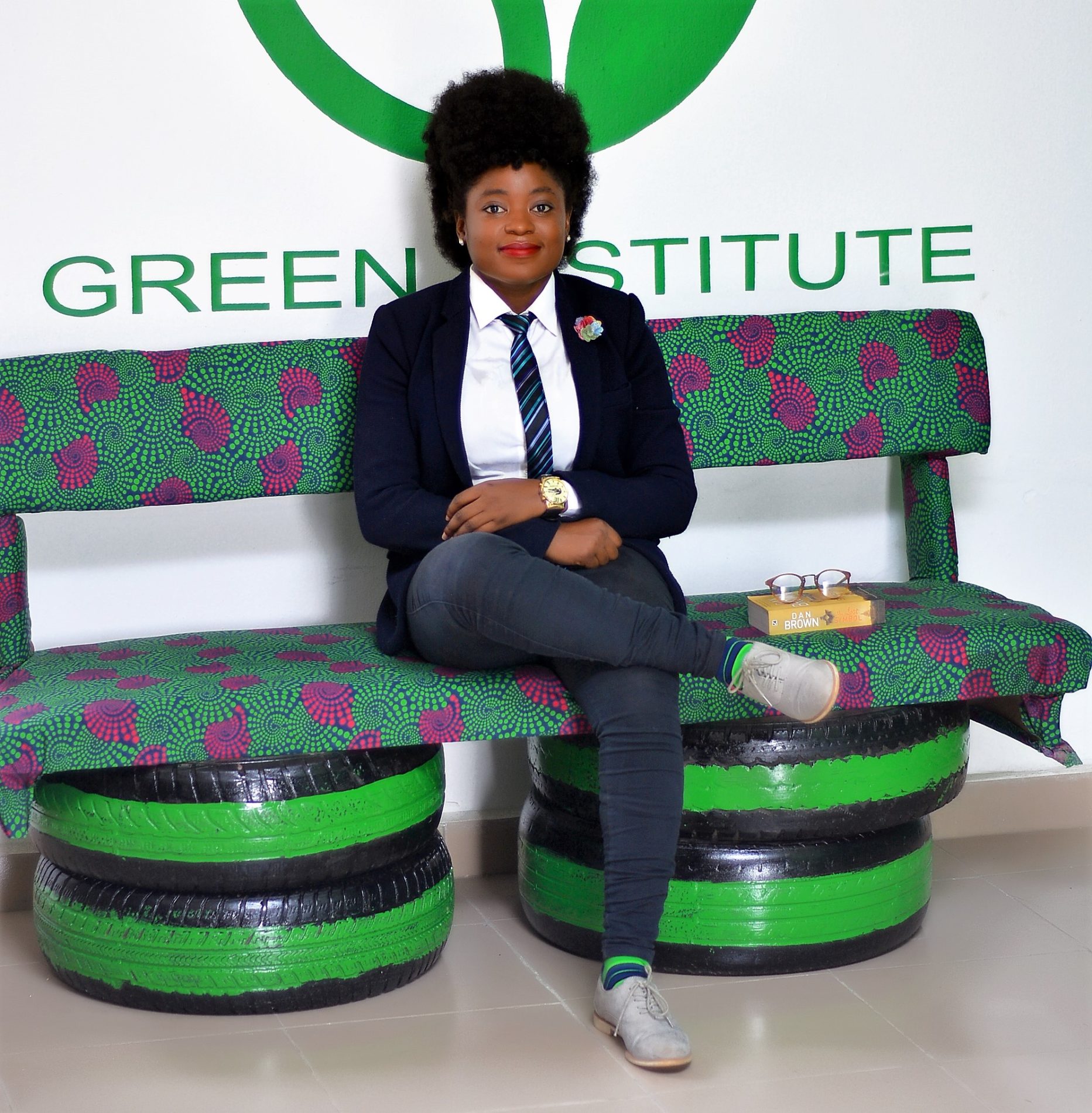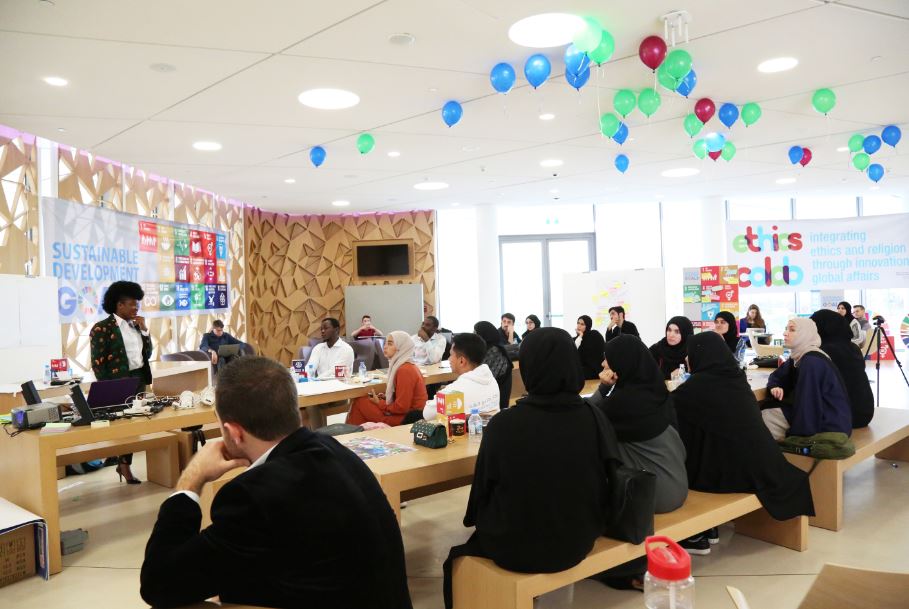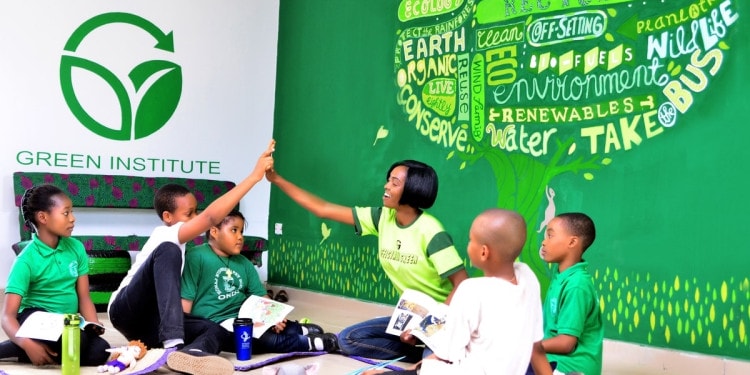Started by Adenike Akinsemolu in Nigeria, the Green Campus Initiative is a prime example of what a person with the environment at heart should do. Educating people about Sustainable Development Goals (SDGs) is one of the main objectives of this project; let’s find out from Adenike Akinsemolu‘s voice, what are the other goals of the Green Campus Initiative and how this project could be a leading example to promote SDGs in Africa.
Would you like to share with our readers the story of the Green Campus Initiative?
Adenike Akinsemolu: I am an environmentalist and an educator. I teach sustainability science and advocate for ‘green’ living.
Since I was young, I’ve had a connection to the outdoors. I grew up in a rural area where I would ride bikes, play football, and explore the landscape. I had a partner who I would hike with and we created some of my fondest memories. These experiences influence my decisions to be a champion of sustainability. You develop a peaceful partnership with nature when you traverse its seemingly endless terrain of green pastures. This is why I’m such a proponent of its pleasures and become defensive when I witness the environment’s destruction by human actions.
I feel as if I am defending the honor of a childhood friend who has given me everything. I must return the favor.
In my travels, I’ve seen significant differences in the relationship between locals and the environment. I’ve witnessed cultures of green living, where everyone does their part to contribute to environmental sustainability. I’ve also witnessed the opposite: students littering on their way to class with a smile on their faces. Adults set even worse examples. Seeing this, my mind started to focus more on educating to change these cultural norms.
We’re far too clever a species to continue to be so foolish.
One day, I asked my students what it meant to ‘go green’. I was met with a sea of blank faces staring back at me. Instead of feeling a sense of defeat, I mustered a bit of courage, which we all have, and took the lack of response as a challenge: I was going to change things. Thus began the Green Campus initiative.

In the Photo: Adenike Akinsemolu. Photo Credit: Green Campus Initiative
What kind of activities does Green Campus Initiative do?
A. A.: It all begins with changing the minds of individuals. Mindsets will then affect attitudes and these attitudes will change behavior. Widespread changes in behavior become new cultural norms, and the process repeats and strengthens.
Visibility is the key. We recruit as many volunteers and Green Ambassadors as we can. This increased awareness of environmental effort has a powerful effect on even the least-engaged passerby. One isn’t as likely to litter when they’re reminded of the detriment it will cause to their environment. We recently instituted a research base with an environmental focus and it’s our goal to be stationed in every university campus in Nigeria.
We want to kick-start the drive for proper waste management where waste collection is compartmentalized for easy sorting and eventual recycling. We are in the early stages of implementing the Trash for Education program which lets impoverished communities trade renewables for books and other educational materials. Sometimes, they’re even able to take a course at the institute. This education will lead to even further innovation. It’s a positive cycle which starts by asking individuals to view their trash in a different light; waste becomes fuel for a better life.
We are currently experimenting with Green Education as a course in secondary schools. This project has been piloted in Homaj Schools. After testing, we’re aiming for the curriculum to be utilized in all schools in the very near future.
I think it’s important to point out that we aren’t simply trying to enforce our personal views. Everything is based on volumes of empirical research and is also research in itself. Therefore, data mining is very high on our list of priorities. If we find that our practices don’t match emerging data, we change the practices. We aim to be the ‘one-stop shop’ for verifiable data regarding ‘green’ practices.
While some of the details might change, the purpose at the heart of these goals will be accomplished. It’s only a matter of time, and we’re past due.

In the Photo: A group of students at the Green Institute. Photo Credit: The Green Campus Initiative
How many people have you trained so far?
A. A.: Nearly 10,000 students from various universities have received training to lead local chapters of the Green Campus Initiative. These chapters themselves can contain hundreds of engaged individuals, so the visibility is growing.
With the transition to the Green Institute two years ago, we have gained international attention and have been invited to train students abroad. Overall, we have trained over 25, 000 individuals globally. While we’re proud of these numbers, we aren’t content. This is only the beginning.
RELATED ARTICLES:
 Burning Questions Behind East Africa’s Infrastructure Boom
Burning Questions Behind East Africa’s Infrastructure Boom
 africanDRONE: Opportunities for Development in Africa Through Tech
africanDRONE: Opportunities for Development in Africa Through Tech
 Catalytic Fund from African Solidarity Transforms Rural Lives
Catalytic Fund from African Solidarity Transforms Rural Lives
What kind of impact do you have on your community?
A. A. : I hesitate to call it my impact. It belongs to all of us in the initiative and those who contributed before us. I do feel as if I’ve been a conduit for change. Going green is becoming trendy. It’s an attractive proposition. One might go as far to say that it’s cool to ‘go green’. Some of my students have been inspired to start a social business, get involved in an environmental movement, or just become the change they want to see in their communities. The energy is palpable. Some are pursuing politics and starting conversations about sustainability in government. For a country like Nigeria, this is an unprecedented change and a step in the right direction.

In the Photo: Adenike Akinsemolu teaching a class about SDGs. Photo Credit: The Green Campus Initiative
What do you think needs to be done to have more women entrepreneurs and initiatives like yours in Africa?
A. A.: Everything begins and ends with education. Change is nearly impossible without first updating what and how we’re teaching our students. Above all, this means teaching the skills required to find the truth while promoting the courage and confidence needed to apply it. Acceptance of a diverse range of social roles for women needs to be embraced in Africa. This will instill the entrepreneurial spirit and turn the latent potential of female Africans into incredible powers of progress.
Young women especially need to be reminded of this potential and we need to remove the roadblocks impeding the fulfillment of this potential.

In the Photo: The Green Team at work. Photo Credit: The Green Campus Initiative
What are your thoughts about the SDGs (Sustainable Development Goals)? How do you think the Green Campus Initiative can give a positive contribution in that sense?
A. A. : The SDGs goals are ambitious, as they should be. It’s important to ‘think big’ but we must remember the importance of (seemingly) small steps. The SDG goals are achievable because progress towards one goal facilitates the achievement of all other goals. They are all linked.
We include The Sustainable Development Goals as an integral part of the Green Education Curriculum we implement. There’s a module dedicated to the goals, and these goals influence the other lessons as well. They are ever present. Recently, I participated in the Ethics Co-Lab where I taught the SDGs alongside the Ethics of Waste to a group of Masters students at the College of Islamic Studies, Hamad Bin Khalifa University. They learned how to approach some of the SDG goals such as poverty, gender inequality, and quality education by creating a business model. There’s the idea that being ‘green’ comes at the cost of economic success, and the students learn quickly that business metrics and actually be fueled by green initiatives. It’s a win-win.
In the Cover Photo: A class of the Green Institute. Photo Credit: The Green Campus Initiative
EDITOR’S NOTE: The opinions expressed here by Impakter.com columnists are their own, not those of Impakter.com










